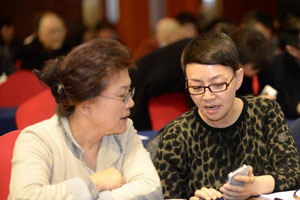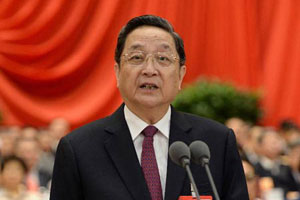Criticisms and suggestions pour from lawmakers
(Xinhua) Updated: 2014-03-12 21:52BEIJING - Chinese lawmakers and political advisors are becoming more active
 |
There has been no shortage of suggestions and blunt criticism from the deputies to the National People's Congress (NPC) and members of the national committee of the Chinese People's Political Consultative Conference (CPPCC) during this year's two sessions.
"Air pollution shows up the loopholes in our management practices," said Qin Dahe, a member of CPPCC national committee and former director of China Meteorological Administration.
"It is bad enough that some businesses ignore the law in pursuit of profits, but lax law enforcement and soft punishments make things even worse," said Qin.
Qin Xiyan, a NPC deputy who runs a law office in the central province of Hunan, shares the weatherman's view.
Businesses only pay a small price when they are caught polluting the environment, turning a worrisome situation into a crisis, said lawyer Qin.
Ou Yangsong of the NPC Standing Committee, wants improved environmental supervision until factories step up their own environmental protection practices.
The smog will only disperse after industrial restructuring and technological advances, said Qin Dahe. He and other lawmakers have a plethora of suggestions on air pollution, a major public concern.
Frequent smog over northern and eastern China brings intense frustration and countless complaints from hundreds of millions of people who live in the murk.
Deputy Liu Zhengjun, vice president of the environmental protection industry association, wants to see a state-level leading group, headed by a top leader, responsible for assessing the fight against smog and punishing those who fail to do their part.
Other major public concerns - food safety, income distribution, education, health and even film censorship - have also had their share of attention.
Lawmakers and political advisors are becoming more professional in their duties, said Yan Jirong, a professor of state governance with Peking University.
The overseas media once depicted Chinese politicos as being without their own voice, but the passionate discussions during this parliamentary session should help to change the stereotype.
In Sunday's work report, Zhang Dejiang, chairman of the NPC Standing Committee, said the legislature would play a greater role in supervision of the State Council, the Supreme People's Court and the Supreme People's Procuratorate.
Yu Zhengsheng, chairman of the CPPCC National Committee, has openly called for discussion, candid exchange and blunt criticism from political advisors.
Last week, Premier Li Keqiang said the government should be subject to the supervision by legislative and political advisory bodies and listen to views of the lawmakers, political advisor and other groups.
Chu Songyan, a professor at the Chinese Academy of Governance, said the citizens had high hopes that lawmakers and advisors would provide constructive criticism and suggestions on their major concerns.
"Only by doing what they are expected to do can the national lawmakers and political advisors live up to the people's trust," said Chu.
 Cell phone fever at two sessions |
- More female officials caught in corruption
- Whampoa veterans recorded with glory
- Police bust 9 terrorist groups in Xinjiang
- Knife-wielding attackers seized in Xinjiang
- New regulation leads to drop in petitioned cases
- Hunan plant shut as probe into lead poisoning begins
- Police boost efforts to combat gambling
- Project offers jobs openings to legal experts
- Experts: Dog meat festival 'illegal'
- Nation looks to upgrade
pipeline networks







